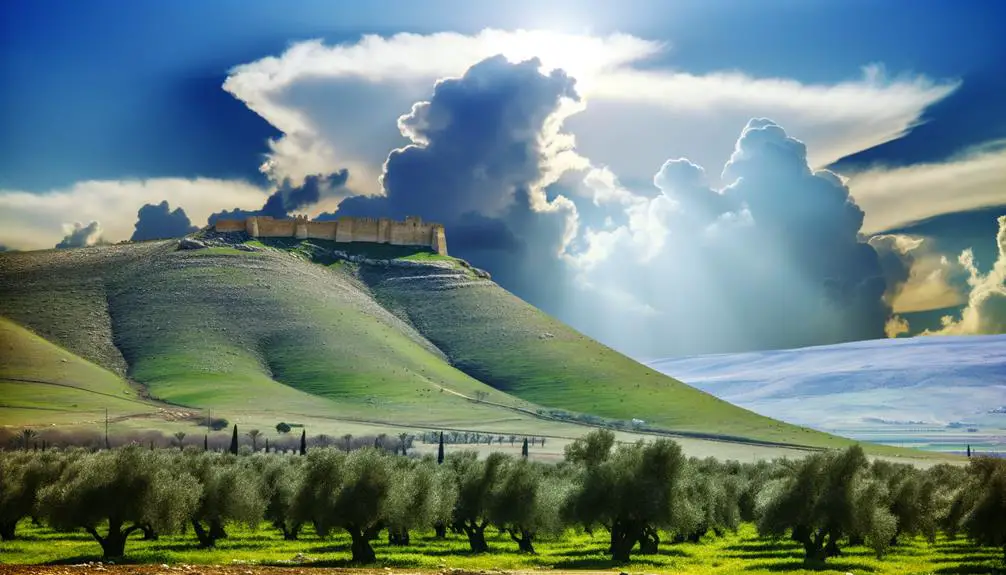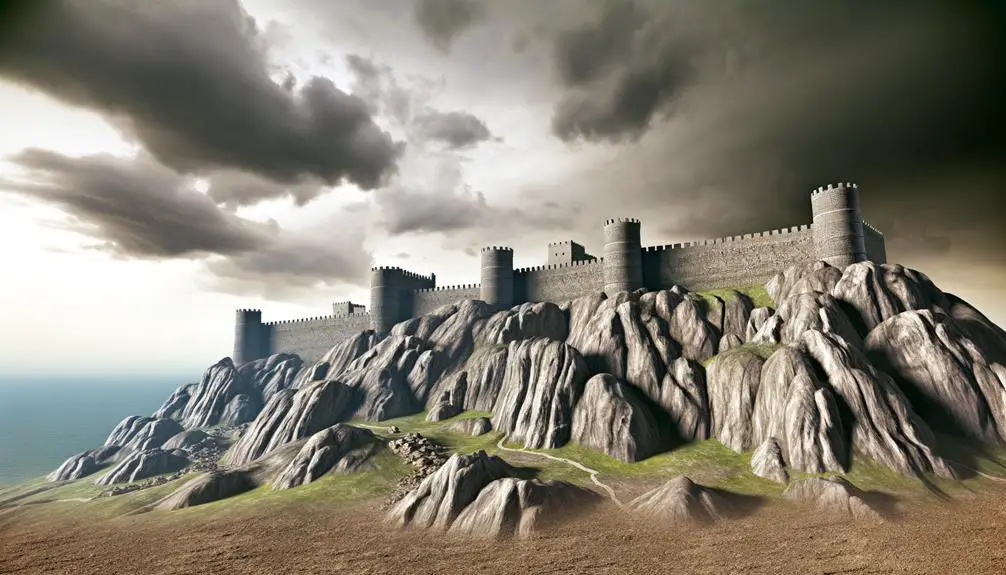Unlock the biblical symbolism of a fortress as a divine protector and explore its profound spiritual significance.

Fortress Definition in the Bible
In the Bible, a fortress is more than just a physical structure; it's a profound symbol of divine protection and strength, anchored in the word 'fortis,' meaning strong. Historically, biblical fortresses were robust, often perched on hills and surrounded by fortified walls, gates, and watchtowers. These elements highlight their purpose: protection and steadfastness. Symbolically, they epitomize divine safeguard, serving as spiritual sanctuaries for believers. This protective imagery is threaded throughout the scriptures, from the Psalms to the New Covenant, where God is depicted as a stronghold in times of trouble, underscoring a deeper exploration into the layers of faith and endurance embedded within.
Key Takeaways
- A fortress in the Bible symbolizes divine protection and strength, offering a spiritual refuge for believers.
- Derived from the Latin word 'fortis' meaning strong, fortresses are depicted as robust, secure structures.
- Biblical fortresses often feature in Psalms and Proverbs, highlighting their role as divine safeguards and moral strongholds.
- In the New Testament, fortresses are linked to God's protective power, especially in the teachings of Apostle Paul.
- The concept extends to modern spiritual practices, where fortresses represent emotional resilience and robust coping mechanisms against life's challenges.
Origin of 'Fortress' in Scripture

Throughout biblical texts, the term 'fortress' frequently emerges as a symbol of divine protection and strength, reflecting its strategic importance in ancient warfare. You'll find that the fortress's etymology ties intricately into its function and form, rooted deeply within ancient military and architectural history. Derived from the Latin 'fortis,' meaning strong, the term evolved through Old French as 'forteresse,' indicating a place of strength and refuge.
Exploring the architectural influences, fortresses in the biblical context were not merely symbolic. They were robust, strategic structures, often situated atop hills or surrounded by walls. These fortifications utilized natural topography to enhance defense capabilities, a common practice in ancient Near Eastern military architecture. The design and construction of these fortresses were influenced by the need to withstand long sieges and repel invaders, incorporating innovations such as double walls, fortified gates, and watchtowers.
The evolution of the fortress in biblical lands wasn't isolated. It reflected broader architectural trends across civilizations, from the massive stone walls of Babylonian cities to the intricate fort systems of the Hittites. Each adaptation not only mirrored military advancements but also the shifting dynamics of power and protection in the ancient world.
Symbolic Meanings of Fortresses
While the physical architecture of fortresses in biblical texts is evident, it's equally important to explore their deeper, symbolic representations as divine safeguards and spiritual refuges. These fortresses are not merely historical or military structures; they embody layers of meaning that resonate with themes of protection and sanctity. You'll find that the defensive architecture symbolizes a robust form of divine protection, suggesting that just as these fortresses physically shield their inhabitants from external threats, spiritually, they represent God's power to safeguard the faithful from spiritual adversities.
The sanctuary symbolism extends this idea by portraying fortresses as sacred spaces where individuals can seek refuge from spiritual turmoil and moral challenges. In the biblical context, these fortresses serve as metaphoric strongholds where believers find solace and strength. They reinforce the notion of an omnipotent protection enveloping those who seek righteousness and truth, providing a spiritual bastion against the forces of evil.
Understanding these symbolic dimensions enriches your comprehension of biblical narratives, where fortresses often appear at critical junctures. They are not just background settings but are integral to illustrating God's active presence and enduring commitment to safeguard His people.
Fortresses in Psalms and Proverbs

In examining fortresses within the Psalms and Proverbs, you'll notice a recurrent motif of strength and security, which serves as a metaphor for divine protection and spiritual refuge. These texts often employ the imagery of a fortress to articulate the steadfast nature of faith amidst adversity. By analyzing this symbolism, you gain deeper insight into the theological and emotional resonance these structures held for the ancient Jewish community.
Symbolism in Psalms
As you explore the Book of Psalms, you'll notice that fortresses are frequently symbolized as places of refuge and strength, reflecting the protective nature of God in times of trouble. These poetic scriptures often intertwine the imagery of divine protection with the rich musical expressions that are central to the Psalms. The fortress metaphor powerfully illustrates the steadfast, unyielding nature of God's safeguarding of the faithful. Within these verses, the fortress not only embodies a physical stronghold but also a spiritual sanctuary, resonating deeply through the rhythmic and lyrical elements of the Psalms. This fusion of musicality and metaphor enriches the reader's understanding of divine security, emphasizing that God's protection is both a shield and a soothing melody to the soul.
Proverbs: Strength Imagery
You'll find that Proverbs, much like Psalms, employs fortress imagery to underscore the concept of strength as both a defense and moral cornerstone. This book of wisdom frequently uses warrior metaphors and references to mighty deeds to articulate the robustness of ethical living. For instance, the imagery of a fortified city not only represents physical security but also symbolizes the impenetrable nature of a righteous character. By analyzing these metaphors, you understand how Proverbs equates moral fortitude with the strength of a fortress—unyielding and protective against moral failings. Such literary tools are not merely poetic; they serve a didactic purpose, teaching that true strength lies in steadfast ethics and spiritual resilience.
New Testament References
Within the New Covenant, the concept of a fortress is often metaphorically linked to God's protective power. You'll find that the Apostle Paul, in particular, employs fortress imagery to describe how God safeguards the faithful. He frequently uses military metaphors to communicate the strength and security found in spiritual commitment. For instance, in his letters, Paul speaks of the 'armor of God' as a form of divine protection against spiritual adversities, encapsulating the fortress-like defense that God provides to those who arm themselves with faith, truth, and righteousness.
This theme of Apostolic protections is further elaborated through Paul's metaphors which underline the role of God as a stronghold in times of peril. In 2 Corinthians, Paul describes God as one who 'comforts us in all our troubles,' suggesting a fortress-like shelter that shields from distress and fear. The implication here is that, just as a physical fortress provides safety, so does faith in God furnish a spiritual refuge against the trials and tribulations of life.
Thus, the New Covenant reiterates the concept of God as a fortress through these vivid illustrations, emphasizing the protective and enduring strength offered to believers. This imagery serves not only as a source of comfort but also as a call to remain steadfast in one's faith amidst adversities.
Fortress Imagery in Prophecy

In biblical prophecy, fortress imagery often symbolizes divine protection and unyielding strength against impending spiritual battles. This motif runs through scriptural texts, serving as a cornerstone for visionary interpretations and apocalyptic metaphors. When prophets such as Daniel or John of Revelation penned their visions, the fortress wasn't just a physical stronghold but a spiritual bulwark against the forces of chaos and evil.
The fortress as a symbol transcends mere historical or literal significance, evolving into a profound emblem within the prophetic narratives. It's not simply about walls and battlements; it's about the assurance of safety and the promise of divine refuge. Let's explore further into some key scriptural references to fortresses in prophecy:
Reference |
Context |
Significance |
|---|---|---|
Daniel 11:38 |
Worship of a 'fortress god' |
Reflects apostasy and misplaced trust in human strength |
Isaiah 25:4 |
God as a fortress for the poor |
Symbolizes divine justice and protection |
Nahum 1:7 |
The Lord as a fortress in times of trouble |
Emphasizes trust and divine refuge in calamity |
Revelation 20:9 |
The beloved city as a fortress |
Represents ultimate divine protection during eschatological battle |
Psalm 91:2 |
God is a fortress and refuge |
Demonstrates personal and communal security in faith |
Through these texts, you can see how the fortress not only provides a backdrop but actively shapes the theological and eschatological landscape of biblical prophecy. Each reference invites deeper reflection on how divine strength and protection are presented in times of spiritual warfare.
Applying Fortress Concepts Today
Reflecting on how fortresses symbolize divine protection and strength in biblical prophecy helps us understand their relevance in contemporary spiritual practices. In today's world, 'fortress' can be metaphorically applied to the constructs of modern security and emotional resilience. Just as ancient fortresses were meticulously designed to protect inhabitants from external threats, your personal spiritual life requires similar fortifications against modern-day challenges.
Modern security systems, both physical and cyber, act as tangible manifestations of fortress principles. They safeguard your physical and digital presences, mirroring the protective attributes of biblical fortresses. However, it's the concept of emotional resilience that aligns more closely with the spiritual fortifications described in the scriptures. Emotional resilience can be seen as your internal fortress, shielding you from psychological and spiritual adversities. It involves building robust coping mechanisms, much like the reinforced walls of a stronghold, enabling you to withstand life's varied assaults.
Developing this form of resilience requires introspection and commitment—akin to maintaining the integrity of a physical fortress. Spiritual disciplines, such as prayer and meditation, serve as the maintenance routines that strengthen your internal defenses. By integrating these practices, you're not just reacting to adversities; you're proactively fortifying your spirit against future challenges, embodying the fortress as both sanctuary and stronghold in your personal life.
Frequently Asked Questions
How Do Children's Bible Versions Explain the Concept of a Fortress?
In children's Bible versions, the concept of a fortress is simplified to symbolize safety and protection, using relatable narratives to make the symbolism accessible and understandable for young readers.
What Archaeological Evidence Supports Biblical Fortress Locations?
You'll find that advanced excavation techniques and precise dating methodologies have substantiated the locations of historical fortresses mentioned in ancient texts, revealing foundations and artifacts that align with recorded events and descriptions.
Are There Specific Prayers Associated With Seeking Refuge in a Fortress?
Yes, specific prayers focus on spiritual protection and employ prayer strategies when seeking refuge. These prayers often invoke divine assistance to emulate the security one might find in a physical or metaphorical fortress.
How Has the Concept of a Fortress Influenced Modern Christian Architecture?
In modern Christian architecture, church designs often incorporate elements of fortresses as symbolic structures, reflecting strength and refuge. You'll notice robust materials and strategic layouts emphasizing protection and spiritual fortitude.
What Are Common Misconceptions About Biblical Fortresses?
You might think biblical fortresses were just stone walls, but their symbolism and defensive strategies are often misunderstood. They represented divine protection, not merely military strength, shaping perceptions beyond their immediate architectural features.



Sign up